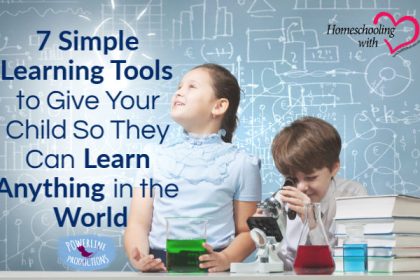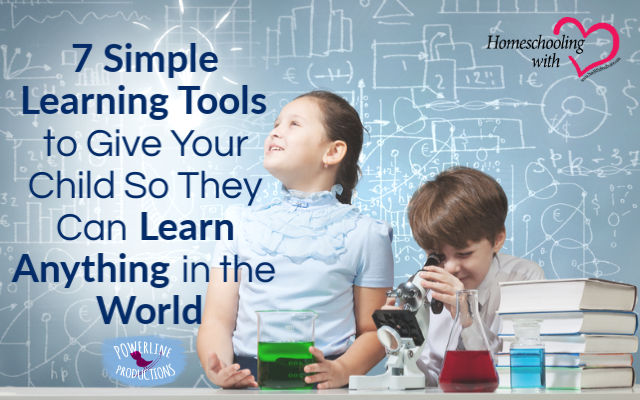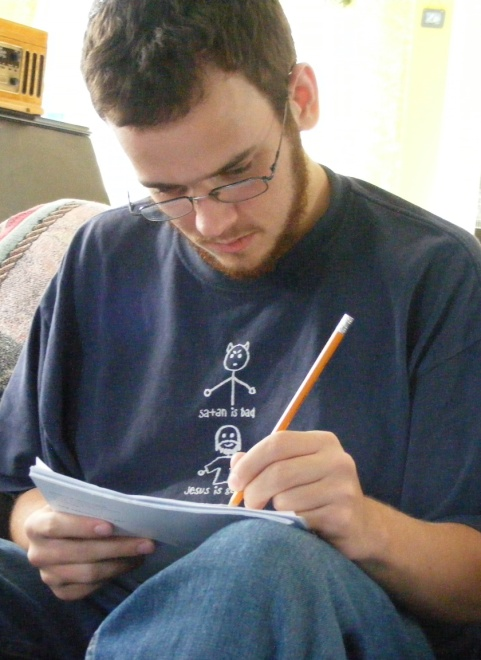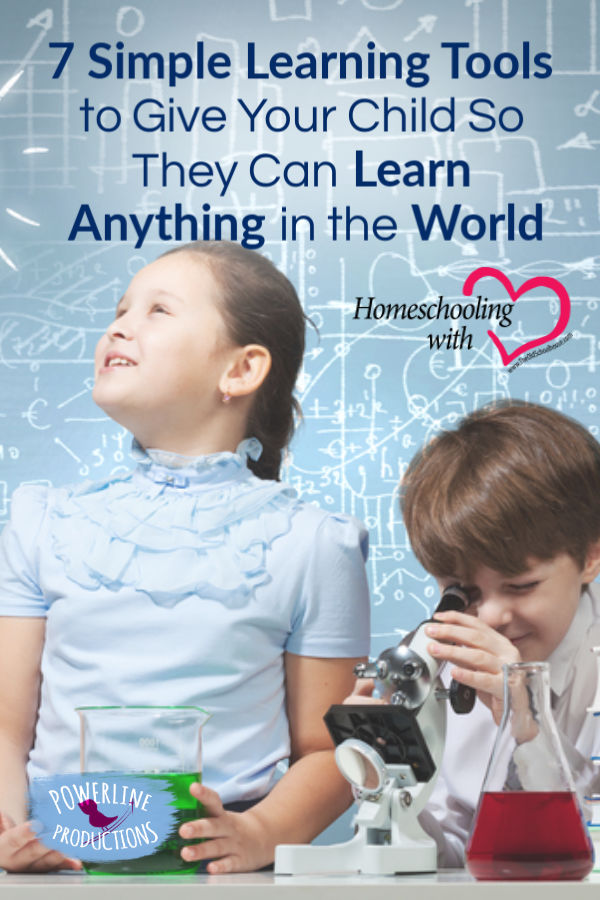7 Simple Learning Tools to Give Your Child So They Can Learn Anything in the World


God has a plan for my children that He hasn’t fully revealed to me. To prepare my children for that unknown future without any revelation of what education will be required, I have chosen to give my children tools of learning. With these tools, they can learn anything!
Reading
Ann, a successful attorney, is one of the smartest people I know. One of her favorite childhood memories is reading classic literature aloud as a family. They enjoyed Tale of Two Cities, Ben Hur, and other classics while other families were staring at a TV screen.
The first learning tool I give my children is reading. God revealed Himself in a book that we have to read. Living books, textbooks, websites, and even texts have to be read. Reading enchanting stories, classic literature, and conversational living books will give our children a love of reading. I want my children to gobble up books, to read for pleasure so that reading is a hobby.
Reading takes children on adventures to different places and time periods. It also builds vocabulary, helps sharpen grammar skills, helps with spelling, and gives children a method of obtaining knowledge from all different spheres.
You can read aloud well-written beautifully illustrated books to babies from birth. Give children a good balance between listening to books read by others, reading on their own, and reading aloud to others. All three build different skills.
My girls all loved to read at an early age. Jimmy hated reading. I had to cajole, threaten, and bribe him to read until high school. It was worth the effort. Guess what his favorite book is? The Count of Monte Christo. That is one long book! Don’t give up on getting kids to find pleasure in reading. Reading is one of my son’s hobbies now, but I honestly wanted to throw in the towel many times.

Mathematics
Julianna and Jimmy loved math! They were born thinking in a logical, orderly way. Math was like a game to them. I had other children who considered math torture. Math is actually a blessing.
Mathematics is a learning tool because it makes pathways in the brain and builds logical thinking in children. Math is the foundation of all upper-level sciences so don’t leave out math. I always start our school day with math after we finish reading the Bible because it’s like giving the brain a workout. It’s easier to learn other subjects after math has invigorated the mind.
Unlike most subjects, math is incremental, meaning you have to learn one thing before you can learn the next thing. Many students feel overwhelmed by math because they move on to the next topic or level without fully understanding and being able to apply what they have just learned.
Math goes beyond understanding to being able to put it into practice consistently with a low level of error. Better to move through math at a slower pace, doing extra review problems when necessary, than staying right on schedule without really understanding what you are doing.
Things to help a struggling math student: board games, sudoku, memory drills, or music (music is mathematical).
Remind children that math is part of real life. “The guy who designed this bridge sure knew a lot about math!” “We’re doing fractions right now by dividing up this pizza.” “Finding his batting average takes math!”
Keep math fun and stay positive when kids struggle with an area of difficulty like fractions or decimals. Remember the little guy who is struggling to memorize his multiplication tables may be an engineer one day. Keep cheering him on!
Communication
“Yes, Ma’am,” she replied. “Can I help you with the dishes?”
Now, that’s a conversation I love to hear!
Communication is another way we learn. We receive information, and we repackage the information to show we have learned it.
In communication we have the message itself, the sender, the receiver, and the mode of transmission.
If I am talking to my daughter about washing the dishes, I am the sender. My daughter is the receiver. The message is about the dishes, and the mode of transmission is talking, or verbal communication.
Our home is full of chatter. I have four daughters, and we always have someone visiting. Sometimes there is much talking but little listening.
God tells us in James 1 that we should be quick to listen and slow to speak. After all, he gave us two ears and one mouth. Listening attentively is a virtue that will be a blessing for my children later in life so it’s worth the time and effort to impart this character trait, starting at a young age.
“So, what did Mommy just say?” I would ask my toddlers and preschoolers. Then when they answered correctly, “You are absolutely right. Wow! You are great at listening, and God says be quick to listen. Good job!”
Communicating clearly is important too. I would ask my children, “Are you saying blah, blah, blah?” That way I could learn to listen to them but also train them to be clear in their own communication. We would often give our communication the kind, truthful, and necessary test. “Is it true? Is it kind? Is it necessary?”
All this training comes in handy when it’s time for formal schooling. Charlotte Mason calls it narration. We read or talk about something, and the children share what they heard or read. It’s a great way to learn!
In addition, respect is key. We taught our children to say “Yes, sir” and “Yes, Ma’am” as well as “Excuse me,” “Thank you,” and “May I please…”
How do you raise respectful children? By treating them and their Daddy with respect. Children imitate what they see. That is why a TV show with disrespectful children is so dangerous for little children to watch.
When there is mutual respect, homeschooling has a different tone. It is more peaceful and conducive to learning.
The most common way we communicate is talking and listening. Learning to express thoughts verbally will make writing easier. Healthy dinner table conversations are a great environment for discussing politics, religion, theology, current events, philosophy, and finances.
Another important way we communicate is in writing.

Writing
Of my five children, three are in the field of written communication, but everyone has to write.
Note-taking, journaling, summarizing, paraphrasing, and writing are learning tools. The act of writing itself causes us to focus our thoughts on a subject like a laser. That process of focusing our thoughts builds pathways in the brain and helps with memory storage. Writing is a great way to remember things.
Writing is also a great way to communicate what you know. A boss writes a memo. A researcher writes up a report. A doctor takes notes on each patient. A nurse makes a care plan. A teacher writes up lesson plans. An author writes a book.
Research
Research can be looking up a recipe on Pinterest or learning all about heart disease when Grandpa has a heart attack.
It’s so easy to “research” now with Google, but I find so much false information online. It is good to teach children to research so that they can find information from trustworthy sources.
Research Skills include:
- Skim a book using table of contents and index
- Take notes
- Create note cards
- Paraphrase
- Summarize
- Make outlines
- Create thesis statement
- Revise
- Edit
- Present research
- Write a research paper
- Publish

Right Living
“Beauty is as beauty does,” my grandmother always said. She meant that it’s what’s in your heart and how you treat people that determine your beauty. I agree with that!
We give our children knowledge and help them understand, but what really matters is wisdom. Applying knowledge and understanding to daily life is wisdom.
We learn about health, exercise, and nutrition. Great! However, right living means flossing daily, working out at the Y, and adding more veggies to our diet.
After reading about compassion in Bible time, a very emotional aunt shows up and we get to put compassion into practice.
Right living involves kindness, virtue, and integrity. Employers call those things “Soft Skills.” The most important part of right living is how we treat the people we love.
Relationships
Treating one another with kindness and politeness helps us get along with others Homes where forgiveness flows back and forth take things to a whole new level, creating a safe environment. When you add intimacy where we trust one another enough to share the deep things, you have those deep loving relationships that we all long for.
Often, we don’t treat people in our family very well, taking them for granted, treating strangers with more courtesy. If that’s true in your house, sit down together, talk about it, pray, and make a plan. Make your home a safe place. No put-downs. No yelling. No rude behavior. Conflict can be handled in a calm way with a goal to restore the relationship. It’s so cool that the Lord has perfect ways in His Word that work in our families. Read Matthew 28 for dealing with conflict and forgiveness. Read Romans 12:9-18 for what loving behavior looks like.
We like to play the encouragement game, choosing one person. Everyone says nice things about that person. It’s great training for cherishing one another.
Healthy relationships in the home breed confidence. I want my children to have the confidence to learn anything God calls them to.
I invite you to use these seven learning tools to prepare your children for a lifelong learning journey of joy and success.
Until next time, Happy Homeschooling,
Warmly,
Meredith Curtis
Meredith Curtis, homeschooling mom, writer, speaker, and publisher, loves to encourage families in their homeschooling adventure. She is the author of Seven R’s of Homeschooling, Travel God’s World Geography, Travel God’s World Cookbook, and HIS Story of the 20th Century. You can check out her books, curricula, unit studies, and Bible studies at PowerlineProd.com. Free Reading Lists for all ages are available at JSHomeschooling.com. Read her blogs at PowerlineProd.com and listen to her at Finish Well Radio.

















































